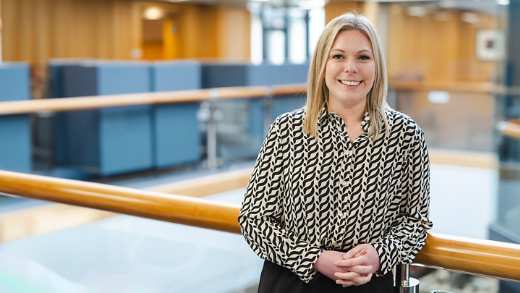- UK adults typically know four of their neighbours by name
- People feel safer and happier if they know their neighbours
- Half of UK residents would like to know their neighbours better
- Renters are more likely to know none of their neighbours – 50% higher than UK average
UK residents typically know just four of their neighbours1 by name, according to a new study from Aviva.
One in 10 UK adults - equivalent to around five million2 people - don’t know any of their neighbours by name. This increases to one in six people aged under 25 (17%) and one in eight aged 25-34 (13%).
The study of 2,057 UK adults was carried out as part of an Aviva home security awareness initiative. It found that:
UK residents feel safer in their homes if they know their neighbours.
of people said they were happier as a result of that.
Aviva data shows a clear trend for home theft claims to increase during the autumn and winter months when daylight is limited. ONS figures3 reveal that three fifths of burglaries happen during the evening or at night, suggesting that some thieves may hide under the cover of darkness.
Susan Sansom, Head of Operations, Aviva UKGI claims says: “Along with practical precautions like locking doors and windows, knowing your neighbours and looking out for one another adds an extra layer of security. This is particularly useful at this time of year when thieves can take advantage of the longer nights.
One in 10 people surveyed said they’d encountered a home security incident in the last 12 months4 , so we’d urge people to be vigilant and keep a look out for vulnerable individuals who may need extra support. Our study found that almost half of the population would like to get to know their neighbours better, so there really is no better time than the present."
Everybody needs good neighbours…
However, while people may not know all of their neighbours, the research suggests UK residents are happy to help one another. Four out of five (84%) people already carry out tasks for people in their community, ranging from taking in parcels (70%), to keeping an eye on their homes when away (36%), to looking after pets (15%).
Residents in the West Midlands, the East of England and Wales are most likely to help out their neighbours.
When neighbours become good friends… (on social media)
Two fifths (38%) of UK adults would class at least one of their neighbours as a close friend. This is a marked increase compared to a similar Aviva study5 carried out in 2017, when just 24% of people said the same.

Knowing one’s neighbours even seems to affect people’s attitudes towards home security: three fifths (61%) of UK residents would be comfortable leaving their doors unlocked because they feel their neighbourhood is safe.
Susan Sansom adds: “It’s brilliant that many consider their neighbourhoods to be safe, but it’s important that people don’t put their homes and belongings at risk as a result. Thieves are opportunistic and it only takes a few seconds for them to dash into an unlocked home and grab someone’s belongings.
“Neighbours and friends can play a vital role in keeping homes secure. If people are going away for the festive season, it’s useful to ask someone to keep a watch on the property to make sure there are no unwanted visitors. And by checking inside the home for anything untoward - such as a water leak - neighbours can help to prevent or reduce damage. So as well as boosting people’s moods, a sense of community spirit can actually help to protect people’s possessions too.”
Further neighbourhood statistics from the Aviva study:
- Renters are less likely to know their neighbours than other groups, with 15% knowing none by name – more than 50% higher than the UK average.
- In comparison only 3% of people who own their home outright and 4% of those who own their house with a mortgage know none of their neighbours by name.
- The proportion of people who would like to know their neighbours better has more than doubled since 2017 (48% compared to just 20% in 2017).
- People in London are more likely to know none of their neighbours compared to other UK regions – one in eight (13%) London adults don’t know any of their neighbours by name.
- ENDS -
Unless otherwise stated, all figures are taken from a survey of 2,057 adults from across the UK, commissioned by Aviva and carried out by Censuswide Research in October 2019.
1. People were asked to consider the neighbours living in the 10 closest houses / flats nearest to their homes. For the purposes of this survey, all members of the same household were classed as one unit, rather than individual people.
2. Based on ONS mid-2018 population estimates.
3. Source: Nature of Crime Burglary 2017/18, ONS.
4. Of those respondents who had experienced a home security incident in the last 12 months, 45% said they had seen a suspicious stranger lurking near their home and 40% had experienced a burglary.
Media enquiries:
Sarah Poulter
UK External Communications
-
Phone
-
+44 (0) 7800 691 569
-
-
Email
Notes to editors:
- We are the UK's leading diversified insurer and we operate in the UK, Ireland and Canada. We also have international investments in India and China.
- We help our 20.5 million (as at 31 December 2024) customers make the most out of life, plan for the future, and have the confidence that if things go wrong we'll be there to put it right.
- We have been taking care of people for more than 325 years, in line with our purpose of being 'with you today, for a better tomorrow'. In 2024, we paid £29.3 billion in claims and benefits to our customers.
- In 2021, we announced our ambition to become Net Zero by 2040, the first major insurance company in the world to do so. While we are working towards our sustainability ambitions, we recognise that while we have control over Aviva's operations and influence over our supply chain, when it comes to decarbonising the economy in which we operate and invest, Aviva is one part of a far larger global system. Nevertheless, we remain focused on the task and are committed to playing our part in the collective effort to enable the global transition. Find out more about our climate goals at www.aviva.com/sustainability/climate and our sustainability ambition and action at www.aviva.com/sustainability.
- Aviva is a Living Wage, Living Pension and Living Hours employer and provides market-leading benefits for our people, including flexible working, paid carers leave and equal parental leave. Find out more at https://www.aviva.com/about-us/our-people/
- As at 31 December 2024, total Group assets under management at Aviva Group were £407 billion and our estimated Solvency II shareholder capital surplus as at 31 December 2024 was £7.9 billion. Our shares are listed on the London Stock Exchange and we are a member of the FTSE 100 index.
- For more details on what we do, our business and how we help our customers, visit www.aviva.com/about-us
- The Aviva newsroom at www.aviva.com/newsroom includes links to our spokespeople images, podcasts, research reports and our news release archive. Sign up to get the latest news from Aviva by email.
- You can follow us on:
- X: www.x.com/avivaplc
- LinkedIn: www.linkedin.com/company/aviva-plc
- Instagram: www.instagram.com/avivaplc
- For the latest corporate films from around our business, subscribe to our YouTube channel: www.youtube.com/user/aviva
















